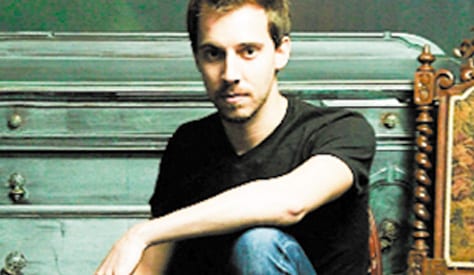Joshua Peugh explores gay sexuality in his world premiere for Dark Circles
Although Joshua Peugh has only been back in the U.S. for a few years, he’s already engendered quite a following — he was labeled one of “25 to Watch” by Dance Magazine in 2015, and no less than the New York Times has called him “an important discovery.”
But despite his Texas roots — he attended SMU — he founded his company Dark Circles Contemporary Dance in 2010 in Seoul, South Korea. Now based in Fort Worth, Dark Circles offers up three world premieres this week, including Peugh’s own Bleachers, which ruminates about the lack of sex education for gay boys.
We sat down with the New Mexico native to discuss how he got his start, and his vision for incorporating gay themes in his latest work. — Alicia Chang
Dallas Voice: When did you first start dancing?
Peugh: I started when I was 3 — ballet and tap — and danced all through growing up. I played soccer for one season and asked my mom if I could go back to tap class. I danced all through high school, though my freshman year of high school I joined the show choir. I did some voice training, so my plan after high school was to study musical theater.
Your family was well-known in your small desert town because your dad was a minister. How did moving to Dallas to attend SMU affect you?
I got to start over and rebuild my identity. I don’t think I realized how much of myself was tied to my family until I left. I had a really happy childhood until I came out to my dad, but that was my sophomore year of college.
Does that coming-out process play a role in Bleachers?
Not overtly. It started with an article I read five years ago about sex education, and the writer made the point that he still felt shame and confusion, even as a straight adult male. He had complicated feelings about the fact that boys teach other boys about sex, and that most of us don’t learn about it from adults or people who have an actual education. But we teach each other all of the social constructs of how a man is supposed to be, how big is better, and all of those silly things.
You tried creating with this theme of sex ed in the past, but then it turned into something else. Why try this subject matter again now?
This time, for the first time, all of the men in the company are actually gay. And I think that’s one of the reasons we are dealing with this subject now. My intention wasn’t to deal with gay sexuality at all, I was trying to explore men in sex ed generally. Now the focus is specifically gay men. It’s already hard for boys because we are told you’re going to want to have sex, don’t do it, you’ll get somebody pregnant.
Why did you set Bleachers in the late 1990s?
That’s when I was in high school and that’s when I was figuring out that I was gay. So first of all, I have some nostalgia for that, but that was literally when I was figuring that stuff out and fumbling my way through trying to figure out sex.
How have the male dancers in your company informed the work?
Well, the way that I create is based on who’s in the room. I don’t just generate movement and teach it. We build everything together. I want their instincts to build what we are creating. I have ideas and a personal aesthetic, but it’s important to let them tell the story they want to tell because in that way the work is authentic, and that way the audience can immerse themselves in the story we’re trying to tell.
How would you describe Dark Circles?
We’re getting ready to start our fifth year here in North Texas, but we just had our seventh anniversary in Korea. Our main goal was to make work that was accessible to as many people as possible and to tell human stories in an honest and authentic way. My goal is to always have people leave the theater with questions about why we [as humans] do what we do.
What I want is for people to not leave what they see in the lobby. I want people to be entertained and enjoy what they see. If that’s all the see in the work, that’s fine with me. But I’d like to plant some seeds. And that’s why I’m doing this dance right now. Because honestly I’m still conflicted about how sex ed should be taught, and how comprehensive it should be. These are still for me, really complicated questions, and usually when I’m making a dance, it’s my way of figuring myself out.
This article appeared in the Dallas Voice print edition May 5, 2017.


















